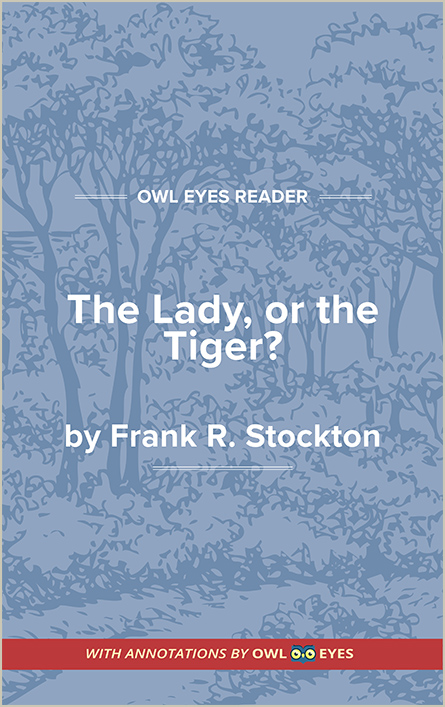Analysis Pages
Character Analysis in The Lady, or the Tiger?
The King: The king is a man of fervor and insatiable will. A “semi-barbaric” man, he has designed a court of chance for the criminals of his kingdom. When he learns of his daughter’s love affair with a lowly cortier, he puts the courtier in the arena. Behind one door is the most suitable marriage candidate in the land. Behind the other is the most fearsome tiger the king could find.
The Princess: The princess is in love with the courtier, and the couple is happy together. However, her father is furious when he learns of the scandalous affair and throws the courtier into prison, and eventually, the arena. The princess, a woman of immense resources and determination, takes it upon herself to learn which door holds the tiger and which holds the lady. However, this knowledge produces a great deal of tension for the princess. She has godlike control over the fate of her lover. Because she knows that she will never see him again no matter which door she leads him to, the choice becomes much more complicated. Either she leads him to the tiger, where he will be devoured almost instantly, or she leads him to the lady, a woman who the princess believes has flirted with the courtier and whom the princess despises. The third act of the story centers around the princess’s struggle with this dilemma, and the story ends without her decision being made clear to the reader.
The Lady: The lady, whose name and identity are unrevealed, is the woman with whom the courtier appears to be having an affair. Should the courtier open the correct door in the arena, this is the woman he shall be met with and married to. She is beautiful and has been chosen by the king’s men to be a perfect bride for the courtier. However, the princess believes her to be a competitor for the courtier’s love, as she’s seen them talking together in the past.
The Lover: The lover is a man who, although of lower status than the princess, is “handsome and brave to a degree unsurpassed in all this kingdom.” He is thrown into the arena for his affair with the princess. He trusts that the princess will discover which door holds which fate, and follows her directions blindly at the trial. His fate is left unresolved at the end of the story.
Character Analysis Examples in The Lady, or the Tiger?:
The Lady, or the Tiger?
🔒"Would it not be better for him to die at once, and go to wait for her in the blessed regions of semi-barbaric futurity?..." See in text (The Lady, or the Tiger?)
"She had lost him, but who should have him?..." See in text (The Lady, or the Tiger?)
"He understood her nature, and his soul was assured that she would never rest until she had made plain to herself this thing..." See in text (The Lady, or the Tiger?)
"intensity of the savage blood..." See in text (The Lady, or the Tiger?)
"terribly interested..." See in text (The Lady, or the Tiger?)
"No matter how the affair turned out, the youth would be disposed of, and the king would take an aesthetic pleasure in watching the course of events..." See in text (The Lady, or the Tiger?)
"Among his courtiers was a young man of that fineness of blood and lowness of station common to the conventional heroes of romance who love royal maidens...." See in text (The Lady, or the Tiger?)
"he was subject to no guidance or influence but that of the aforementioned impartial and incorruptible chance..." See in text (The Lady, or the Tiger?)
" king's arena..." See in text (The Lady, or the Tiger?)
"arena..." See in text (The Lady, or the Tiger?)
"half of him which was barbaric..." See in text (The Lady, or the Tiger?)

